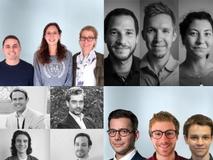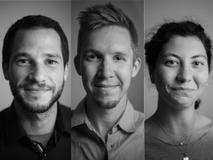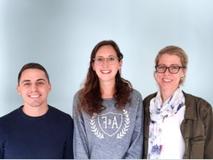Startups developing a novel antibody-based therapy for corneal transplant rejection, an innovative glass technology, AI for portable ultrasound devices, and a technology to filter natural sunlight each win CHF 10,000
25.10.2021
EMUNA Therapeutics, nu glass, SightIn Health, and Voltiris win Venture Kick's first financial and entrepreneurial support stage. Their projects help improve corneal transplant success rates; nu glass offers a solution to improve wireless connectivity indoors; making portable ultrasound machines more accessible, and aim at enabling the co-sharing of arable land with clean power generation, while keeping the agricultural yield high.
 |
 Nu Glass CEO Luc Burnier, Engineer Jeremy Fleury, and Intern Azad Kalamian
|
 SightIn Health CEO William King, CMO Mehdi Namdar, Chief of AI Pablo Castellanos, CPO Marius Jatautas, and Head Applied Science Andreu Arderiu
|
 EMUNA Therapeutics: Left - Dr. Morgan Hunter (Project leader / CEO)
Middle - Aline Bauer (PhD student / Researcher)
Right - Prof. Dr. Cornelia Halin Winter (Co-founder / SAB member)
|
EMUNA Therapeutics: a novel antibody-based therapy for corneal transplant rejection
Despite corneal transplants being the most common transplant procedure, donor corneas are frequently rejected by the recipients' immune system. Up to 25% of patients experience a rejection episode, and approximately half of these episodes lead to transplant failure and a return to blindness. Current treatments are ineffective and cause serious side effects, leaving a critical need for novel treatment options. Bringing together experienced immunologists at ETH Zurich (Prof. Dr. Cornelia Halin Winter, Dr. Morgan Hunter and PhD researcher Aline Bauer) and leading corneal transplant specialists at Uniklinik Koln (Prof. Dr. med Claus Cursiefen & PD. Dr. Felix Bock) the team identified a novel target molecule involved in the early stages of the rejection response. Based on these findings, and supported by an Innosuisse Innovation project, EMUNA has developed a targeted antibody therapy (topical eye drop solution) for the prevention of corneal transplant rejection. Following proof of concept in animal studies, EMUNA is now seeking additional financing in order to advance the therapy towards the clinic. Development of this novel treatment solution will help improve transplant success rates, allowing transplant patients to keep their sight whilst freeing up valuable donor tissue for first-time patients. EMUNA plans to use Venture Kick financing to support early business development focused around team recruitment and investor reach-out.
Nu Glass: Better wireless connectivity through innovative glass technology
Lack of connectivity is often observed in an indoor environment. One of the solutions is to install repeaters, but they have to be replaced at every change of technology (e.i. 4G to 5G), are complicated to install, not reliable, and expensive. A new alternative is to install mobile phone permeable glass. This solution requires the replacement of the entire glazing. It is a no-go for existing buildings or trains due to the complexity of execution and costs.
Luc Burnier, a curious and enthusiastic physics engineer from EPFL has so far been tackling these challenges by himself and is currently under a InnoGrant program hosted in the laboratory of LESO-PB, ENAC in Dr. Andreas Schüler’s group, under the supervision of Professor Jean-Louis Scartezzini. With Nu Glass, they offer a solution to improve wireless connectivity indoors. By making glass pervious to mobile phone frequencies, there is no more need for routers and repeaters. The startup will offer on-site service to overcome the lack of indoor mobile phone connectivity, by making modern glazing transparent to microwaves. Standard insulating glazing combined with concrete walls or metallic structures leads to poor indoor network quality. This unwanted effect is due to metallic coatings in modern windows. By structuring the coating with a high-precision laser system, they are able to overcome this effect and improve drastically the signal/microwave transparency of the glazing. . In Switzerland the market represents around 1700 train carriages with a market value of approximately CHF 16 Million. Considering a rough estimation, the building market in Switzerland would be around CHF 150 to 200 million.
The Venture Kick funds give them financial security for the first year of the start-up incorporation and will be used to obtain and ensure the first contracts and kick into the market. nu.glass
SightIn Health: Making portable ultrasound machines more accessible
Ultrasound hardware that cost in the past $100ks, now cost $1ks. MedTech hardware manufacturers like Philips, Butterfly, and Clarius have commoditized ultrasound with pocket-size units that plug straight into an iPhone. These units were built for general practitioners, nurses, primary care physicians. The problem is that these professionals have no training that normally takes more than 4 years to reliably use an ultrasound machine. Even further, trained sonography experts vary significantly from the repeatable analysis of machines. Therefore, there is a need to remove the knowledge barrier.
SightIn Health is an AI-SaaS company in the Digital Health space that enables superior use and interpretation of portable ultrasound machines. the team is composed of CEO William King IV, CPO Marius Jatautas, master's degree from EPFL in management of technologies, AI Tech Lead Pablo Cañas Castellanos, AI Specialist Andreu Arderiu, Double BSc in Math and Physics, and MSc in Statistics at EPFL. Their proprietary AI engine automatically performs quality assessment, ultrasound probe guidance, and image analysis. SightIn Health software lowers the necessary skill barrier required to use ultrasound equipment and
capture the highest-quality medical imaging and interpretation for patient diagnostics and prognostics. As a result, ultrasound will become a truly democratized, ubiquitous, and hyper-reliable medical imaging procedure. They have access to 10,000 ultrasound scans from HUG. Their TAM is estimated at USD 113 billion, their SAM at USD 42 billion, and the target market USD 23 billion.
The Venture Kick funds will be used for product development and commercial refinement.
Voltiris: Filtering natural sunlight to transmit it to plants and recycling the "wasted" sunlight into green electricity
Agricultural greenhouses are key toward a sustainable food supply, however, they have extremely high energy needs mostly due to heating and artificial lightening.
This results in 2 main issues: (1) an energy cost equivalent to ~ CHF 300Mn per year in Switzerland alone, for a surface of approx. 500ha of greenhouses and (2) a significant carbon footprint. As an example, 2kg of CO2 are emitted for each kg of greenhouse tomato.
Voltiris' solution to greenhouse owners -imagined by co-founders Jonas Roch, Nicolas Weber and Dominik Blaser - filters spectrally sunlight: our solution provides plants with the light components (i.e. colors) they need, while the light components not needed for plants growth are recycled into electricity without causing any shading.
This results in the generation of up to 50% of the farmers' needs to run the greenhouse, allowing them to reduce significantly their carbon footprint and operating costs.
In Switzerland alone (< 1% of global market size), this would result in savings of up to CHF 75Mn for farmers, and the equivalent emissions of 50,000 people.
The Venture Kick funds will help them with market feasibility study, product development and legal support. voltiris.com
Despite corneal transplants being the most common transplant procedure, donor corneas are frequently rejected by the recipients' immune system. Up to 25% of patients experience a rejection episode, and approximately half of these episodes lead to transplant failure and a return to blindness. Current treatments are ineffective and cause serious side effects, leaving a critical need for novel treatment options. Bringing together experienced immunologists at ETH Zurich (Prof. Dr. Cornelia Halin Winter, Dr. Morgan Hunter and PhD researcher Aline Bauer) and leading corneal transplant specialists at Uniklinik Koln (Prof. Dr. med Claus Cursiefen & PD. Dr. Felix Bock) the team identified a novel target molecule involved in the early stages of the rejection response. Based on these findings, and supported by an Innosuisse Innovation project, EMUNA has developed a targeted antibody therapy (topical eye drop solution) for the prevention of corneal transplant rejection. Following proof of concept in animal studies, EMUNA is now seeking additional financing in order to advance the therapy towards the clinic. Development of this novel treatment solution will help improve transplant success rates, allowing transplant patients to keep their sight whilst freeing up valuable donor tissue for first-time patients. EMUNA plans to use Venture Kick financing to support early business development focused around team recruitment and investor reach-out.
Nu Glass: Better wireless connectivity through innovative glass technology
Lack of connectivity is often observed in an indoor environment. One of the solutions is to install repeaters, but they have to be replaced at every change of technology (e.i. 4G to 5G), are complicated to install, not reliable, and expensive. A new alternative is to install mobile phone permeable glass. This solution requires the replacement of the entire glazing. It is a no-go for existing buildings or trains due to the complexity of execution and costs.
Luc Burnier, a curious and enthusiastic physics engineer from EPFL has so far been tackling these challenges by himself and is currently under a InnoGrant program hosted in the laboratory of LESO-PB, ENAC in Dr. Andreas Schüler’s group, under the supervision of Professor Jean-Louis Scartezzini. With Nu Glass, they offer a solution to improve wireless connectivity indoors. By making glass pervious to mobile phone frequencies, there is no more need for routers and repeaters. The startup will offer on-site service to overcome the lack of indoor mobile phone connectivity, by making modern glazing transparent to microwaves. Standard insulating glazing combined with concrete walls or metallic structures leads to poor indoor network quality. This unwanted effect is due to metallic coatings in modern windows. By structuring the coating with a high-precision laser system, they are able to overcome this effect and improve drastically the signal/microwave transparency of the glazing. . In Switzerland the market represents around 1700 train carriages with a market value of approximately CHF 16 Million. Considering a rough estimation, the building market in Switzerland would be around CHF 150 to 200 million.
The Venture Kick funds give them financial security for the first year of the start-up incorporation and will be used to obtain and ensure the first contracts and kick into the market. nu.glass
SightIn Health: Making portable ultrasound machines more accessible
Ultrasound hardware that cost in the past $100ks, now cost $1ks. MedTech hardware manufacturers like Philips, Butterfly, and Clarius have commoditized ultrasound with pocket-size units that plug straight into an iPhone. These units were built for general practitioners, nurses, primary care physicians. The problem is that these professionals have no training that normally takes more than 4 years to reliably use an ultrasound machine. Even further, trained sonography experts vary significantly from the repeatable analysis of machines. Therefore, there is a need to remove the knowledge barrier.
SightIn Health is an AI-SaaS company in the Digital Health space that enables superior use and interpretation of portable ultrasound machines. the team is composed of CEO William King IV, CPO Marius Jatautas, master's degree from EPFL in management of technologies, AI Tech Lead Pablo Cañas Castellanos, AI Specialist Andreu Arderiu, Double BSc in Math and Physics, and MSc in Statistics at EPFL. Their proprietary AI engine automatically performs quality assessment, ultrasound probe guidance, and image analysis. SightIn Health software lowers the necessary skill barrier required to use ultrasound equipment and
capture the highest-quality medical imaging and interpretation for patient diagnostics and prognostics. As a result, ultrasound will become a truly democratized, ubiquitous, and hyper-reliable medical imaging procedure. They have access to 10,000 ultrasound scans from HUG. Their TAM is estimated at USD 113 billion, their SAM at USD 42 billion, and the target market USD 23 billion.
The Venture Kick funds will be used for product development and commercial refinement.
Voltiris: Filtering natural sunlight to transmit it to plants and recycling the "wasted" sunlight into green electricity
Agricultural greenhouses are key toward a sustainable food supply, however, they have extremely high energy needs mostly due to heating and artificial lightening.
This results in 2 main issues: (1) an energy cost equivalent to ~ CHF 300Mn per year in Switzerland alone, for a surface of approx. 500ha of greenhouses and (2) a significant carbon footprint. As an example, 2kg of CO2 are emitted for each kg of greenhouse tomato.
Voltiris' solution to greenhouse owners -imagined by co-founders Jonas Roch, Nicolas Weber and Dominik Blaser - filters spectrally sunlight: our solution provides plants with the light components (i.e. colors) they need, while the light components not needed for plants growth are recycled into electricity without causing any shading.
This results in the generation of up to 50% of the farmers' needs to run the greenhouse, allowing them to reduce significantly their carbon footprint and operating costs.
In Switzerland alone (< 1% of global market size), this would result in savings of up to CHF 75Mn for farmers, and the equivalent emissions of 50,000 people.
The Venture Kick funds will help them with market feasibility study, product development and legal support. voltiris.com


